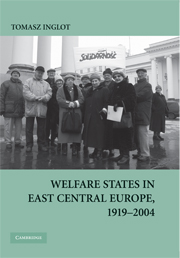Book contents
- Frontmatter
- Contents
- Figures and Tables
- Acknowledgments
- Welfare States in East Central Europe, 1919–2004
- Introduction: Understanding Past and Present Social Policy Development in East Central Europe
- 1 The Welfare State in East Central Europe: A Conceptual and Theoretical Reconsideration
- 2 Institutional Legacies: State Building, Regime Change, and the Development of National Welfare States in Czechoslovakia, Poland, and Hungary, 1919–1989
- 3 Policy Legacies and Welfare States under Communism: Cycles of Social Policy Expansion and Retrenchment in Czechoslovakia, Poland, and Hungary, 1945–1989
- 4 Historical Legacies, Welfare State Institutions, and the Politics of Social Policy Reforms in Postcommunist East Central Europe, 1989–2004
- Conclusion: Postcommunist “Emergency” Welfare States and Theoretical Exploration of Institutional Change and Social Policy Development
- Bibliography
- Index
Introduction: Understanding Past and Present Social Policy Development in East Central Europe
Published online by Cambridge University Press: 25 July 2009
- Frontmatter
- Contents
- Figures and Tables
- Acknowledgments
- Welfare States in East Central Europe, 1919–2004
- Introduction: Understanding Past and Present Social Policy Development in East Central Europe
- 1 The Welfare State in East Central Europe: A Conceptual and Theoretical Reconsideration
- 2 Institutional Legacies: State Building, Regime Change, and the Development of National Welfare States in Czechoslovakia, Poland, and Hungary, 1919–1989
- 3 Policy Legacies and Welfare States under Communism: Cycles of Social Policy Expansion and Retrenchment in Czechoslovakia, Poland, and Hungary, 1945–1989
- 4 Historical Legacies, Welfare State Institutions, and the Politics of Social Policy Reforms in Postcommunist East Central Europe, 1989–2004
- Conclusion: Postcommunist “Emergency” Welfare States and Theoretical Exploration of Institutional Change and Social Policy Development
- Bibliography
- Index
Summary
The dissolution of communist regimes of Eastern and Central Europe marked a beginning of a new stage in social policy development. At first, the examination of common Marxist-Leninist history, comparable processes of change from command economy to free market, and a revival of the earlier, Bismarckian social insurance traditions gave rise to predictions of a difficult but also mostly similar future for the former communist welfare states in transition.
Exposed to relentless pressure of capitalist economics and democratic politics, the seemingly underdeveloped systems of social protections in eastern countries were all expected to shrink even further and experience severe financial and political crises (Offe 1993; Barr 1995). More recently, successful accession to the European Union of the eight former Soviet republics and satellites, Czech Republic, Estonia, Hungary, Poland, Latvia, Lithuania, Slovakia, and Slovenia, opened up the possibility of a forthcoming convergence of social legislation between east and west, or even more universally on the global level (Linden 2002; Orenstein 2005). Closer examination of the developments since 1989, however, points to a much more complex reality. By the late 1990s many scholars and welfare experts have begun to notice and analyze striking variations in social policy institutions and actual policy decisions among individual countries throughout the postcommunist region (see, e.g., Kramer 1997; Cook, Orenstein, and Rueschemeyer 1999; Müller 1999; Tomka 2004; Cain, Gelazis, and Inglot 2005).
- Type
- Chapter
- Information
- Welfare States in East Central Europe, 1919–2004 , pp. 1 - 20Publisher: Cambridge University PressPrint publication year: 2008



